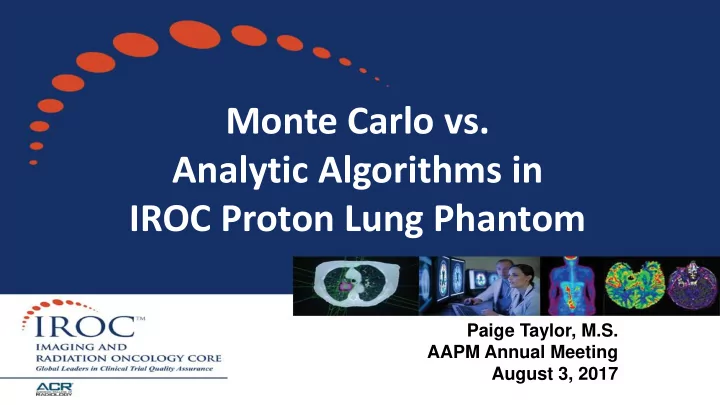

Monte Carlo vs. Analytic Algorithms in IROC Proton Lung Phantom Paige Taylor, M.S. AAPM Annual Meeting August 3, 2017
IROC’s Mission Provide quality control programs in support of the NCI’s National Clinical Trial Network thereby assuring high quality data for clinical trials
Proton Phantom Audits Brain H&N Liver Spine Prostate/pelvis Lung/thorax
Proton Lung Phantom Design • Target moves behind “ribs” • Low density heterogeneities • Contains TLD and radiochromic film for absolute and relative dose comparison with TPS
Proton Lung Phantom Concerns • Lung phantom pass rate 63% – Disagreement between measurements and TPS, both in absolute dose and shape of delivered dose to target • Concerns about analytic (pencil beam) TPS algorithms – Subset of phantom plans recalculated using Monte Carlo algorithms
Lung Phantom Results: PB
Lung Phantom Results: MC
Lung Phantom Results Pencil Beam original calc Monte Carlo recalc
Lung Phantom 2: PB
Lung Phantom 2: MC
Proton Lung Treatment - MC
Proton Lung Phantom Results • Discussed findings with NCTN clinical trial PIs – IROC recommending all proton centers explore MC for lung dose calcs – Photon lung trials do not allow pencil beam algorithms – Perhaps future enrollment for protons will require MC for lung?? • Article in press with the Red Journal
PB vs. MC in Other Disease Sites?
PB vs. MC in Other Disease Sites?
Next Steps • Investigating pencil beam algorithm accuracy in H&N and liver – H&N: High density (bone) and low density (nasal passages, oral cavity) – Liver: Low phantom pass rate • BIG improvements seen with Monte Carlo but not all MC appears equal – Working with proton centers to look at different MC algorithms • RayStation, Eclipse AcurosPT, TOPAS, MCSquare
Questions?
Recommend
More recommend